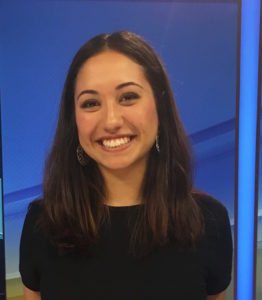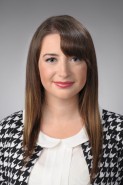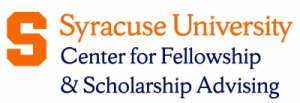Fulbright Semi-Finalists: Teaching English to the Next Generation
The Fulbright U.S. Student Program offers research, study and teaching opportunities in over 140 countries to recent graduates and graduate students. Syracuse University has fifteen semi-finalists who have applied to Open Study/Research Awards, Teaching Assistant Awards, the Fulbright-National Geographic Digital Storytelling Fellowship and the J. William Fulbright – Hillary Rodham Clinton Public Policy Fellowship. These semi-finalists are now waiting to hear back from the deciding committees in each foreign country where they have applied to work and learn. Meghan Mistry and Rachel Brown-Weinstock are two semi-finalists in the English Teaching Award category.
 Meghan, a communications student, applied for a Fulbright ETA to teach English in Malaysia because she is eager to explore the connection between teaching and journalism. She says, “In both, you have to effectively communicate information and find creative ways for the listener to absorb it. I’m also extremely interested in the world and want expand my knowledge through travel.” She chose to apply for the ETA because she thinks knowing English can open doors to future generations of international students. This could become a vital skill in their career development and in helping their nation and region. She chose Malaysia because she had never been to Southeast Asia and was interested in learning more about how Islam and Malaysian culture work together. She believes Fulbright will help her with her professional goals as a political journalist, and that she’ll learn a great deal from being able to experience a new culture and work with a younger generation.
Meghan, a communications student, applied for a Fulbright ETA to teach English in Malaysia because she is eager to explore the connection between teaching and journalism. She says, “In both, you have to effectively communicate information and find creative ways for the listener to absorb it. I’m also extremely interested in the world and want expand my knowledge through travel.” She chose to apply for the ETA because she thinks knowing English can open doors to future generations of international students. This could become a vital skill in their career development and in helping their nation and region. She chose Malaysia because she had never been to Southeast Asia and was interested in learning more about how Islam and Malaysian culture work together. She believes Fulbright will help her with her professional goals as a political journalist, and that she’ll learn a great deal from being able to experience a new culture and work with a younger generation.
Meghan believes that success happens when you start early. She recalls, “I started drafting my Fulbright essays in mid-June. I worked with the CFSA office all summer to send drafts and get edits back. During the summer I communicated with CFSA staff via email and on a few Skype calls. When I got to campus in the fall I went to as many writing sessions as possible to get feedback from more people and from my peers. The feedback was honestly amazing. I had close to 20 drafts of each essay, and staff really helped me hone in on what I should focus on and how to best present it.”
 Rachel Brown Weinstock is a semi-finalist for an ETA to teach in South Africa. She applied for a Fulbright ETA because she loves teaching and understand how much teaching helps her learn about herself. She has worked and studied in South Africa during the past two summers assisting with community-based participatory research, conducting her own independent research, and volunteering at a non-profit called Inkululeko, which helps students find jobs or prepare for university. Her previous experiences in South Africa are what have made her so passionate about going back.
Rachel Brown Weinstock is a semi-finalist for an ETA to teach in South Africa. She applied for a Fulbright ETA because she loves teaching and understand how much teaching helps her learn about herself. She has worked and studied in South Africa during the past two summers assisting with community-based participatory research, conducting her own independent research, and volunteering at a non-profit called Inkululeko, which helps students find jobs or prepare for university. Her previous experiences in South Africa are what have made her so passionate about going back.
“On my first trip to South Africa, I met and tutored Nomathemba—a tenacious girl from Grahamstown’s Joza township who aspired to be the first in her family to attend university. After returning my second summer, Nomathemba’s teacher told me that her dedication would never hold her back from university, but her English skills might. I want to serve as an ETA in South Africa not only for my own educational development, but also because I am dedicated to improving the education of marginalized youth who deserve to live a life of passion. In South Africa, all educational instruction, including at the university level, is provided using the English language. English language acquisition for township populations is thus crucial in combating the residual affects of apartheid and continued discrimination.”
Rachel worked closely with CFSA, but she had to hit the ground running since she decided to apply just a month before the first deadline. CFSA staff set extra deadlines for Rachel to keep her on task in her shortened timespan. CFSA has instilled in Rachel the confidence necessary to tackle these applications.
Rachel’s goal is to pursue a PhD in sociology conducting research at the intersections of community sociology, culture, and poverty/inequality and teach sociology as a professor. She hopes to use her degree to become a “sociologist in action.” Rachel says, “I know that the key to conducting influential public sociological research and constructing effective policy and programming is understanding the lived experiences of the population you are engaging with. I know that to understand these lived experiences, you must work to empower, authentically engage, and develop mutually beneficial relationships with this population. I can think of no better next step on my career pathway than serving as an ETA in South Africa to achieve these goals.”
